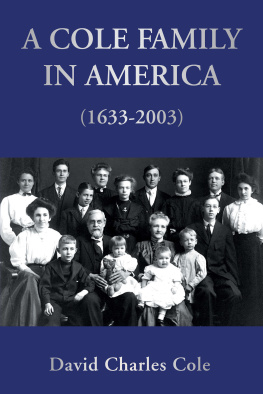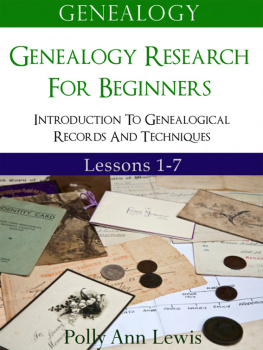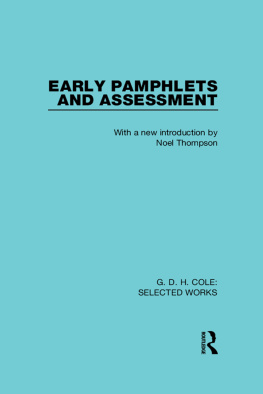A COLE FAMILY IN AMERICA
(1633-2003)
Descendants of Daniel Cole of
Plymouth Plantation (1633)
The
First Eleven Generations
DAVID CHARLES COLE
Copyright 2019 by David Charles Cole.
3 rd Edition
Library of Congress Control Number: | 2006909568 |
ISBN: | Softcover | 978-1-4257-4111-2 |
eBook | 978-1-4653-2002-5 |
All rights reserved. No part of this book may be reproduced or transmitted
in any form or by any means, electronic or mechanical, including photocopying,
recording, or by any information storage and retrieval system,
without permission in writing from the copyright owner.
Any people depicted in stock imagery provided by Getty Images are models,
and such images are being used for illustrative purposes only.
Certain stock imagery Getty Images.
Rev. date: 07/17/2020
Xlibris
1-888-795-4274
www.Xlibris.com
574118
CONTENTS
THE FAMILY IN AMERICA
AUTHOR

This short history is dedicated to the memory of members of the Cole family recorded in its pages. These individuals passed their DNA, talent, and strong Christian values on to those who followed in the line. All members in the eleven generations in the line since 1633 are represented in the belief that every one should be noted and honored.
Most of those named had been lost to history, unknown and unsung by subsequent generations. Only a few of their names and none of the details of their lives were remembered. It seemed appropriate, therefore, to assemble in one place what names and details could be recovered through scores of hours scouring dusty library shelves to acknowledge those whose genetic makeup and personal qualities continue to flow through this branch of the Cole family.
Let us praise . . . our ancestors . . . Most left no memory, and disappeared as though they had not lived, perished as though they had never existed, they and their children after them. Yet, their offspring will continue forever and their glory will never be blotted out. (Ecclesiasticus 44:1-15)
What follows is a brief review of the ancestral line of one branch of the Cole family in America. It begins with Daniel Cole who traveled from England to the colonies in 1633 and ends with his descendant David Charles Cole in 2003. The span of the review covers 11 generations and 370 years.
I undertook this project to correct numerous inaccuracies found in Joseph A. Curtis book, The Descendants of Elisha Cole (19) published in 1909, and to bring many additional historical details to light. It was also my desire to surface and record the contribution our forebearers made to the family and nation, being reminded that: in death no one remembers you; or gives you thanks in the grave . (Psalm 6, vs. 5)
All that remains of the early years in the life of this branch of the Cole family is what can be gleaned from civil and church records, family Bibles, and bits of oral history. Information on the lives of early members of the family is extremely limited. Their day-to-day struggle to satisfy immediate needs left them little time to contemplate a place in history or note any but major family events (i.e., births, baptisms, marriages, deaths). Precious little is known of the personalities of those who formed early Cole family units or the joys and pains they shared. I have attempted to fill this void by inserting relevant historical details. Still, we are left trying to view their world as through a pane of smoked glass, relying on our imagination to complete the picture.
Complicating my research is the fact that given names, particularly Daniel and Elisha, were used frequently in the branching of the family tree. At times there were three or four living family members named Daniel or Elisha, related as father, son, grandson, or cousin. This frequent occurrence required great diligence to sort out and ascribe relationships, events, activities, and possessions accurately.
Details on women in the family were most difficult to uncover as they were not normally recorded. I have attempted to rectify this beginning in the ninth generation where information is more readily available. A more balanced reporting of the contribution of women in the family reflects the importance of the bloodline and heritage of each spouse.
I have included facts on the Cole surname, Cole family heraldry, and a few comments on the rigors and pitfalls of the genealogical research process. To assist the reader, I have incorporated a lineage graphic tracing descendants from Daniel Cole to the present and several illustrations. Farm and home locations are noted when known to aid those wishing to visit the sites to come into closer contact with their physical roots.
Well-intentioned researchers who constructed histories without carefully referencing their sources confounded the search for genealogical details on the family line. Use of any such material must be made with great care. Information in this work is based on primary sources or publications quoting first-order sources. All sources are listed in the Bibliography and noted where appropriate throughout the text. Where I paraphrase, credit is given by noting the source following the text.
Our story in North America begins in 1633 when the names of three Cole brot hers from Southwark, Surrey, England (John, Job, and Daniel) appear in the annals of the Plymouth Plantation. Daniel is indisputably our ancestor. As descendants of the union of his son, William Cole, and Hannah Snow of Plymouth, we are all descendants of Mayflower passenger Constance (Hopkins) Snow and her father Stephen Hopkins, a Pilgrim and signer of the Mayflower Compact.
All in this line who can trace roots back to Daniel and Ruth Cole of Plymouth are kinsmen with a common heritage. They can take pride in knowing that their ancestors were respectable, hardworking, stable, religious citizens in good standing in their respective communities:
As a race, the Coles (descendents of Daniel Cole of Plymouth Colony) proved themselves sturdy, courageous, self-reliant and independent. They clung to the religious principles and hard-working habits of their Puritan ancestry, and throughout the length and breadth of America they have spread the example of the Gospel and the sturdier virtues which go to make the nation great . (19, p. 4)
The highest tribute to the dead is not grief, but gratitude. I hope that the information that follows will serve as a sustaining force for future family readers, providing an appreciation of their heritage and a feeling of historic stability in an increasingly inconstant world.
Too often an easy indulgence presumes that family names borne by prominent or historic families in England assure some connection with the immigrants family. In truth, most English emigrants to colonial New England and Virginia came from cottages, not manor houses. The few who were in any way related to nobility and gentry are well known, and have been since the time of their arrival.
A scion of an emigrant family would have had no cause to conceal his noble birth and allow his descendants to remain ignorant of their lofty heritage. Lords of the manor had little reason to leave England. They were particularly well situated at home, a condition they would not abandon readily. Instead, most early settlers had been tenants for generations and were eager to be landowners themselves.
Reliable investigations initiated on the basis of claims of noble birth have usually led to proof of yeoman origin. This is not to suggest that those who came were the driftwood of English life. On the contrary, these early pioneers were the backbone of English yeomanry. (7, pp. i-xiii)
Next page













